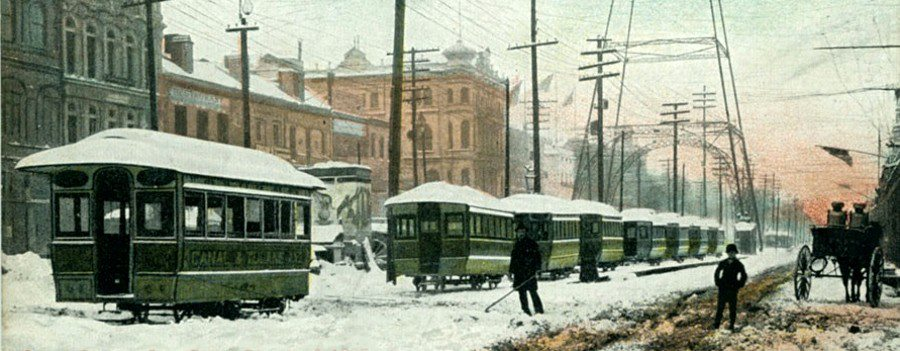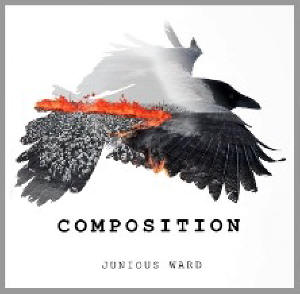
~ Delta Poetry Review ~
Junious Ward Book Review by Stephen Furlong
|
Ward, Junious "Jay." Composition: Poems. Button Poetry, 2023. 116 pp. $21.00
Collectively, the poems, illustrations,
and erasures housed in Composition all embrace, explore,
dissect, and interrogate language, history, and narratives
in a profound and meaningful way. Early on in the book,
Junious Ward provides an example of an erasure that
transforms the source text into a poem in a fascinating way;
the poem is “#219.” In the Notes section, Ward states the
poem comes from the Racial Integrity Act of 1924 (SB 219)
which, further still, is shared in its entirety via the
book’s appendix. The poem is expressed in multiple forms of
erasure—from the words themselves, blackout, selective
focus, even Mad Lib-esque.
Side bar: Moving the lens off the poem for a moment, from a
societal standpoint, erasure also comes from “whitewashing”
certain groups, primarily those of Black, Indigenous, and
People of Color (BIPOC) as to make their culture more easily
palatable. Ward’s poems remind us we must work to celebrate
individuals and groups for the values and contributions they
bring from their own distinctive communities and cultures.
In Part II of “#219,” titled The Long
Game, I was struck by the repetition of the word
penitentiary; in a way, this part becomes ghazal-like with
its form and structure. For example:
Be it enacted, any negro, or mixture thereof,
personally registering
shall be punished by the penitentiary.
For each registration properly made, the registrant
shall be humbled by the penitentiary.
Marriage shall be granted to applicants of
pure white race
only, no epithalamia sung in the penitentiary,
save a white person. No other non-Caucasic blood
shall avoid running from the penitentiary.
Further still, the verbiage leading up
to penitentiary is also fascinating—punished,
humbled—and it continues in an evocative way throughout
the section. The variation of verb choice encapsulates the
variety of experience, and depending on the tone and
expression of the word choice, it may indicate an illusion
of actual protection. Humbled, for example, is a word
of dual-meaning; in context, it explores defeating someone
and their dignity, but if one is merely just reading the
law, it could possibly sound like a positive thing because
humble, as a noun, as an abstract concept elicits positive
connotation. That’s why it is so revealing that it is
illustrated as a verb here. “#219” is indicative of
Composition as a whole: creative and incisive, layered
and nuanced.
Junious Ward’s Composition
requires a reader’s full attention; the collection does not
mince words or images. To quote blurb writer Jody Chan, Ward
“…resurrects personal, familial, and collective histories in
striking and vivid language, each poem cinematic,” which is
how I see the collection as well; it presents itself like a
documentary film, and Ward’s direction is striking and
powerful. An example of these shared histories comes from
“Google Image Search: Boston Massacre,” which is an
imagining of Crispus Attucks speaking to Colin Kaepernick.
Attucks was the first American killed in the Boston Massacre
in 1770, and Kaepernick played professional football for the
San Francisco 49ers and, in 2016, used his platform as
athlete to protest police brutality by kneeling during the
National Anthem. Right from the beginning, Ward’s poem
commands attention:
We tiptoe the line
of protesting and provoking,
don’t we? Suffer a kind
of death like a hero,
a martyr. Takes a while
but searching our name
eventually shows a Black
man wounded, bleeding,
mulatto man with a song
overtaking the mouth.
The call to attention comes from the
power of Ward’s stand-alone line writing which explores
lingering meanings. For example, “We tiptoe the line” both
reflects the color line as well as the lines of law that
separate those who the law is enforcing. I found the
stand-alone line “don’t we? Suffer a kind” also fascinating
in this context. In addition to its striking investigation
of histories, this poem is a masterclass in line break
and enjambment, creating powerful moments and dualing
(dueling) images. It also houses another arresting question:
“How could we be disrespectful/to an owner?” The duality of
owner relates to slavery and alludes to the powers-that-be
of San Francisco. The poem ends in powerful imagery and
posits “…history will concede/our place.” As it should—with
both men, Attucks and Kaepernick, being revered as heroes.
When spending time with Junious Ward’s poems, one must be
willing to contend with poems and history—both elements lead
the reader toward places some would rather forget or may be
tired of hearing. This is especially true in an enduring
piece, “The Narrative,” a stunning form poem—a
villanelle—Ward opens:
The stories tell so similar I can’t tell if I’m
dreaming or
remembering hands pinned to ground, hands penned
writing some manacled version of the future.
Hands behind the wheel or up, a toy gun, a licensed
gun
–daughter watching, mother watching, father, son,
cousin.
The stories be so similar I can’t tell if I’m
dreaming or
reaching for my ID, stepping out of the car,
compliant, viral.
The assassination will be Live, my brother, viva la
revolución,
igniting some Orwellian version of the future.
Considerate of the form’s framework, the
repetition builds power and engages the reader in a
concentrated, determined way. Written across five tercets
and a closing quatrain, Ward creates a poem that focuses on
fear and power as it relates to law enforcement and those
hyper-subjected to law’s enforcement. The poem’s success is
driven by its language, its power comes from repetition and
attention to detail, and it embodies what is most successful
from the collection. The collection’s success comes from its
timely use of form for creative and critical attention, its
powerful fusillade of language and history, and the striking
use of repetition to illustrate the fusion of these
elements.
As a whole, Junious Ward’s poems require attention and focus, they require the reader to embrace the challenge. I assure you, reader, if you are able to do that, then what will follow is a book of poetry that will leave you transformed. One cannot read a Junious Ward poem and not be transformed—this collection was revelatory in its expression and hard-hitting in its execution. |
| Archive | Submissions | About | News |
 One
of the enduring lessons learned from writing comes from my
community college days: embrace the challenge. I was
a fresh flameout from my four-year institution and found
myself on a new campus mere footsteps from my high school.
My first semester I re-took English Composition because I
received a ‘D’ the first time I took it. The class was more
intensive than I expected, yet to my dismay then, I received
a ‘B’ in the course. I was annoyed and, while I didn’t
complain about my grade, I did reach out to my instructor
about the grade following the semester’s end. She plainly
spoke the advice shared above: embrace the challenge.
One
of the enduring lessons learned from writing comes from my
community college days: embrace the challenge. I was
a fresh flameout from my four-year institution and found
myself on a new campus mere footsteps from my high school.
My first semester I re-took English Composition because I
received a ‘D’ the first time I took it. The class was more
intensive than I expected, yet to my dismay then, I received
a ‘B’ in the course. I was annoyed and, while I didn’t
complain about my grade, I did reach out to my instructor
about the grade following the semester’s end. She plainly
spoke the advice shared above: embrace the challenge.